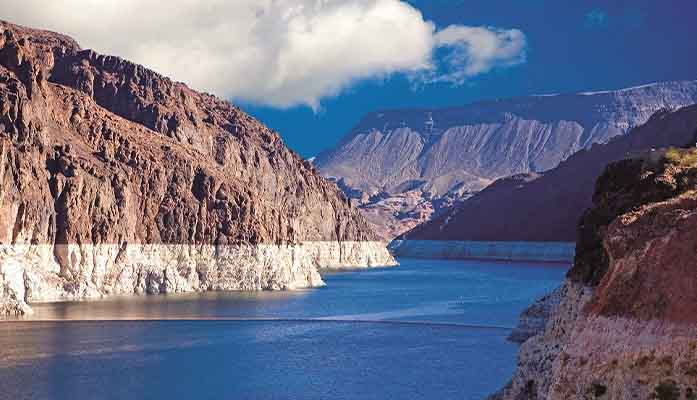
by Daniel Stefanski | May 24, 2023 | News
By Daniel Stefanski |
An Arizona legislative attempt to prohibit photo radar has been sent to the Governor’s Office.
Last week, the Arizona House of Representatives passed SB 1234, sponsored by Senator Wendy Rogers, with a vote of 32-26 (with one member not voting and one seat vacant). The bill would “forbid the use of photo radar systems to enforce traffic law.”
Stopping photo radar has long been a focus of Senator Rogers, who forecasted her plans to introduce this legislation last summer. Rogers said, “The photo radar industry made its home base in Arizona. And that ends next year. We’re no longer going to allow government to spy on Arizonans for profit and trample due process rights.”
After the House approved the proposal, Republican lawmakers cheered its success on social media. Representative Rachel Jones tweeted, “This week, we passed SB 1234 to ban photo radar. These cameras are the biggest scam of all time, and completely unconstitutional. This was a huge win for freedom!!!”
Representative Joseph Chaplik wrote, “Photo radar is a corrupting scheme in our state and it needs to end now. I proudly voted yes for SB 1234 yesterday to ban it completely, just like 16 other states did.”
And Representative Austin Smith posted, “Photo radar is a racket and abuse of our 4th, 5th and 6th amendment rights. How politicians before approved this is shameful. I proudly voted yes to ban photo radar in Arizona. Good bill, Wendy Rogers!
Before passing the House last this month, this legislation had languished in the legislative process. The House Military Affairs & Public Safety Committee had considered the bill back on March 6, passing it with an 8-7 vote. Earlier in the session, the Senate Government Committee had cleared the measure with a 5-3 vote; and then the full Senate giving the green light with a 16-13 tally (with one member not voting).
Rogers had a dozen co-sponsors for the bill – all Republicans. Senators Ken Bennett, Sonny Borrelli, David Farnsworth, David Gowan, Jake Hoffman, Steve Kaiser, John Kavanagh, Anthony Kern, Sine Kerr, JD Mesnard, (President) Warren Petersen, and Janae Wadsack were the co-sponsors.
Representatives from the City of Chandler, the City of Avondale, the Town of Paradise Valley, the City of Mesa, the Arizona Chapter National Safety Council, the Arizona Public Health Association, and the League of Arizona Cities & Towns noted their opposition to the bill as it moved through the two legislative chambers.
Governor Hobbs is expected to veto this piece of legislation.
Daniel Stefanski is a reporter for AZ Free News. You can send him news tips using this link.

by Daniel Stefanski | May 23, 2023 | Education, News
By Daniel Stefanski |
After a period of relative peace between Arizona Legislative Republicans and Democrat Governor Katie Hobbs, her veto pen has again enflamed the political division between the two sides.
On Monday, Arizona Senator John Kavanagh announced that Governor Hobbs had vetoed SB 1001, relating to school policies about pronouns and biological sex. According to Kavanagh’s release, his bill “would have prohibited a school district or charter school from knowingly referring to students under the age of 18 by a pronoun that differs from the child’s biological sex, or a first name that is not listed in school records;” and it “would have also prevented schools from requiring their staff to use a pronoun that differs from a person’s biological sex, if doing so is contrary to their own personal convictions.”
Kavanagh blasted Hobbs for her veto, saying, “Parents have a right to know if their children are in psychological turmoil. Parents also need to know if their children are confused, depressed, anxious, isolating themselves, having suicidal thoughts or are in need of mental health care because of gender dysphoria. Parents can’t get their children the counseling or therapy needed if their school is hiding this information from them. Additionally, if a child is receiving mental health care and that child’s physician advises not to treat the child as a different gender, then a school going against the doctor’s wishes without the parent’s permission would create reason for a lawsuit. This is a dangerous situation for children who are struggling with mental health issues. For the Governor to turn a blind eye to what’s happening is reckless and irresponsible. I would expect more from a former social worker.”
Last week, Hobbs transmitted a veto letter to the Arizona Senate, explaining her justification, writing, “As politicians across the country continue to pass harmful legislation directed at transgender youth, I have a clear message to the people of Arizona: I will veto every bill that aims to attack and harm children. I want to thank the young people that bravely testified against SB 1001 at the Legislature. To you, I promise to be an ally and to uplift your stories. Additionally, I would like to thank Representative Lorena Austin for telling their story and speaking their truth. I would like to reemphasize their words to all the young people of the state, ‘You have every right to be who you are.’”
After the Arizona House of Representatives passed the bill last week, Janae Stracke from Heritage Action issued a statement in support of the Legislature’s efforts, writing, “As the Left continues to push radical gender ideology in schools and strip parents of their right to know what their children are learning, it’s time for parents and legislators in Arizona to start fighting back with common sense. By passing SB 1001, legislation that ensures school systems obtain parental consent before changing a student’s name and pronouns and protects school employees from violations of their religious or deeply-held beliefs, the Arizona Legislature upheld parental rights across the Grand Canyon State.”
Daniel Stefanski is a reporter for AZ Free News. You can send him news tips using this link.

by Daniel Stefanski | May 23, 2023 | News
By Daniel Stefanski |
Arizona received some significant news this week when it came to its water future.
On Monday, Democrat Governor Katie Hobbs released a statement in conjunction with California’s and Nevada’s governors, announcing that “the Colorado River Lower Basin States have developed a plan to conserve 3 million acre-feet over the next three years to protect the Colorado River system.”
The three governors also sent a letter to U.S. Department of the Interior Secretary Deb Haaland, informing her of their support for this plan. The governors’ release revealed that “the Lower Basin Plan has been submitted to the Bureau of Reclamation with all Seven Colorado River Basin States supporting its evaluation as an action alternative within the Near-Term Colorado River Operations Draft Supplemental Environmental Impact Statement (Draft SEIS).”
Hobbs issued the following statement to accompany her announcement: “The Lower Basin Plan is the product of months of tireless work by our water managers to develop an agreement that stabilizes the Colorado River system through 2026. Thanks to the partnership of our fellow Basin States and historic investments in drought funding, we now have a path forward to build our reservoirs back up in the near-term. From here, our work must continue to take action and address the long-term issues of climate change and overallocation to ensure we have a sustainable Colorado River for all who rely upon it.” According to the Department of the Interior, “the consensus-based proposal – agreed upon by the three Lower Basin states – commits to measures to conserve at least 3 million-acre-feet (maf) of system water through the end of 2026, when the current operating guidelines are set to expire. Of those system conservation savings, 2.3 maf will be compensated through funding from the historic Inflation Reduction Act, which is supporting efforts to increase near-term water conservation, build long term system efficiency, and prevent the Colorado River System’s reservoirs from falling to critically low elevations that would threaten water deliveries and power production. Under this consensus proposal, the remaining system conservation needed for sustainable operation will be achieved through voluntary, uncompensated reductions by the Lower Basin states.”
Interior Secretary Haaland said, “There are 40 million people, seven states, and 30 Tribal Nations who rely on the Colorado River Basin for basic services such as drinking water and electricity. Today’s announcement is a testament to the Biden-Harris administration’s commitment to working with states, Tribes and communities throughout the West to find consensus solutions in the face of climate change and sustained drought,”
Some Democrat legislators reacted positively to the news out of the Governor’s Office. Senator Mitzi Epstein tweeted: “Smart goals are measurable, verifiable, and enforceable. This smart plan will conserve water – via voluntary agreements among Tribes, cities, & agriculture – to reduce the risk to Lakes Mead and Powell thru 2026. Thank you Governor Hobbs!
And Senator Christine Marsh added, “Thank you Governor Hobbs. I’m glad Arizona was able to reach a short-term agreement to address our water shortage.”
Daniel Stefanski is a reporter for AZ Free News. You can send him news tips using this link.

by Daniel Stefanski | May 22, 2023 | News
By Daniel Stefanksi |
A water-related measure is clearing its final hurdles in the Arizona Legislature.
On Monday, the Arizona Senate passed HB 2022, sponsored by Representative Tim Dunn, which deals with reports on water fees and levees.
HB 2022 is “an emergency measure that extends the date, from July 1 to August 15, for the Director of the Arizona Department of Water Resources (ADWR) to annually provide a report of the ADWR’s operations to the Governor and the Legislature.” The bill also “outlines ADWR fee maximums for applications,” and it “requires the Water Infrastructure Finance Authority of Arizona (WIFA) to distribute monies to Navajo County for the Little Colorado River Levee budget line item.”
The proposal cleared the Senate with a 28-0 vote (with two members not voting) and was transmitted to the House for concurrence. Earlier in the session, the House approved of the bill by a 58-2 tally.
In the Senate’s Committee of the Whole session this week, Senator Sine Kerr amended the bill, which earned applause by Democrat Senator Priya Sundareshan, who highlighted the efforts to reduce ADWR application fees and exempt ADWR from rulemaking requirements. Senator Sundareshan stated, “We need to support better groundwater management and help our rural areas.”
When HB 2022 was considered before the Senate Natural Resources, Energy and Water Committee, Ben Alteneder, the Legislative Liaison for the Arizona Department of Water Resources, briefly testified before the members, informing the panel that ADWR was neutral on the bill and had no issues with it. In February, a representative for the Western Growers Association signaled support for the legislation.
Daniel Stefanski is a reporter for AZ Free News. You can send him news tips using this link.

by Daniel Stefanski | May 20, 2023 | News
By Daniel Stefanski |
Arizona Republican Legislators are laser focused on the issues that matter most to their state.
Earlier this week, the Joint Legislative Committee on Water Security met for its first meeting since being formed in April by Arizona Senate President Warren Petersen and House Speaker Ben Toma. The purpose of this committee was “to convene and solicit information from water users, stakeholders, and the public regarding state solutions to address water security in Arizona.”
According to a press release sent by the House Majority Communications on Wednesday, members of the committee met “to outline (the committee’s) goals for the ensuing months and to hear preliminary testimony on the most pressing issues facing Arizona’s water supply.”
For this first meeting, the press release announced that the “committee heard presentations from the Salt River Project and the Water Infrastructure Finance Authority (WIFA) to get a better understanding of the current water outlook for the state, as well as the level of investments that Arizona has made and will be making in new water infrastructure over the next several years.”
WIFA’s Assistant Director, Chelsea McGuire, presented detailed information to the Committee “on the funds and options available to residents and communities to help improve water supplies and strengthen the water resources that Arizona communities and economies depend on.” The Water Conservation Grant Fund will provide up to $200 million to Arizona cities, towns, counties, irrigation districts, natural resource conservation district, and domestic improvement districts. There will also be up to $190 million in additional funds to “rural cities, towns, and counties located outside of the Phoenix, Pinal, and Tucson active management areas to develop projects that promote the replenishment, recovery, reclamation, and recharge of stormwater and groundwater in rural parts of the state.”
Both of the Committee’s Co-Chairs, Senator Sine Kerr and Representative Gail Griffin, issued statements after the meeting’s conclusion. Senator Kerr said, “Upon the Governor’s signature of a bill I’m working on this session, even more entities will be able to take advantage of the WIFA conservation dollars. We need an all-of-the-above solution for this critical issue that impacts all Arizonans. These investments in conservation programs and new water supply development projects will be pivotal as we continue to meet as a committee to address our state’s most pressing water challenges.”
Representative Griffin added, “We’re doing great things to help the State of Arizona and rural communities with water solutions. WIFA is making historic investments that will help us to save water and put more water back into the ground, especially in rural parts of the state. Local communities that want to take more control over their future water supplies should encourage eligible entities to take advantage of these tools.”
The Committee revealed its “next steps,” which include “scheduling future meetings to hear from experts on issues such as groundwater modeling, management best practices for urban and rural areas across the state and finding additional sources of water for Arizona communities.”
Daniel Stefanski is a reporter for AZ Free News. You can send him news tips using this link.





